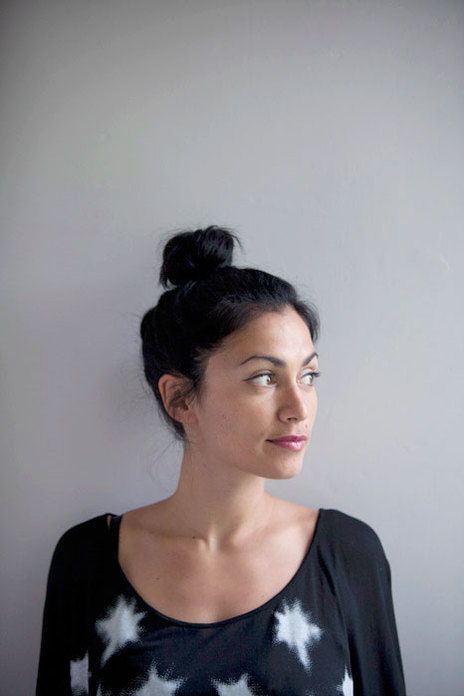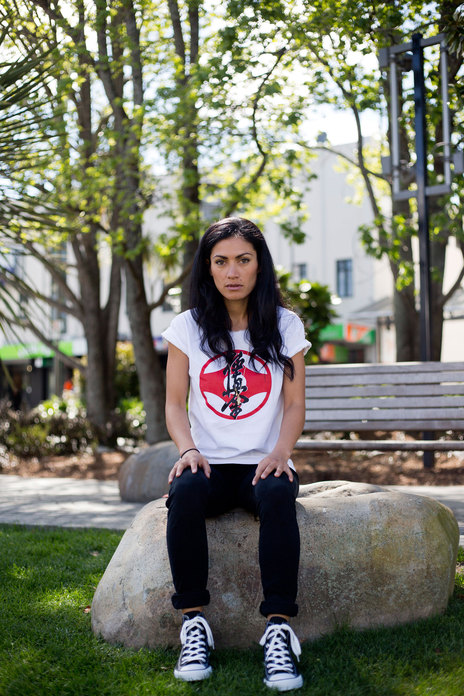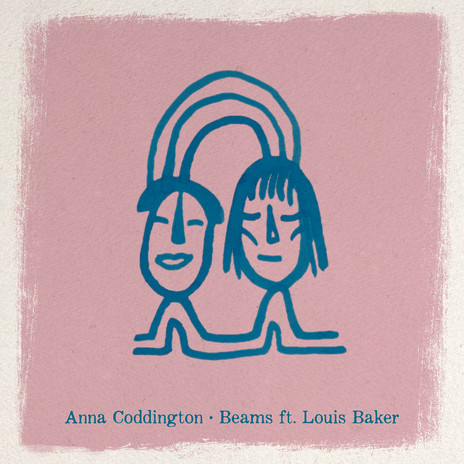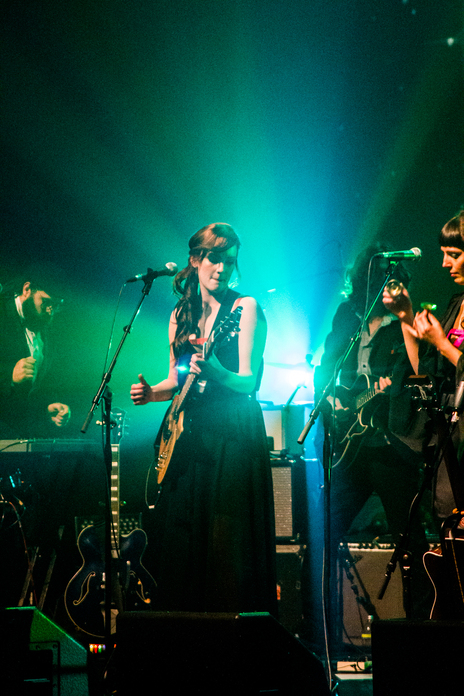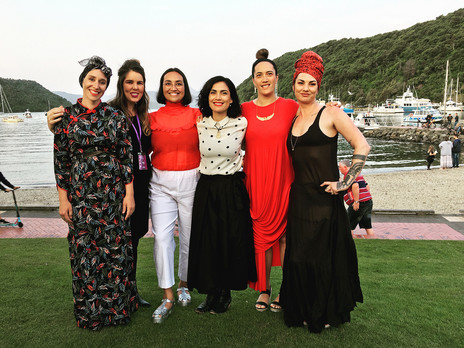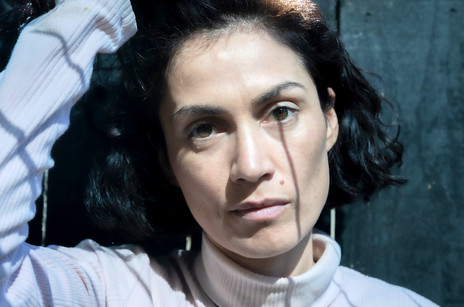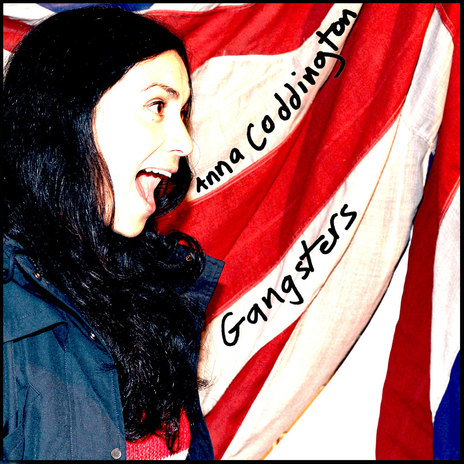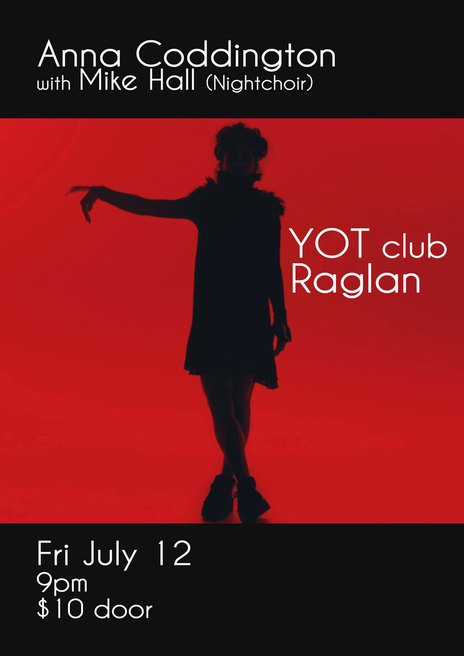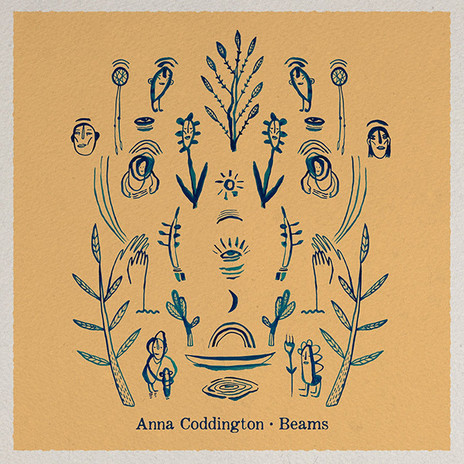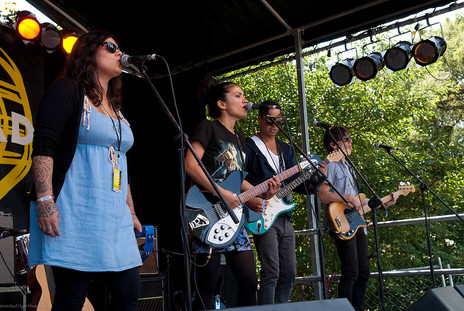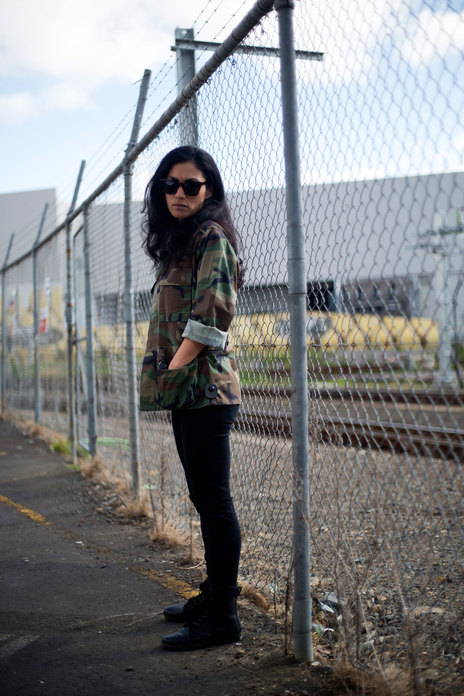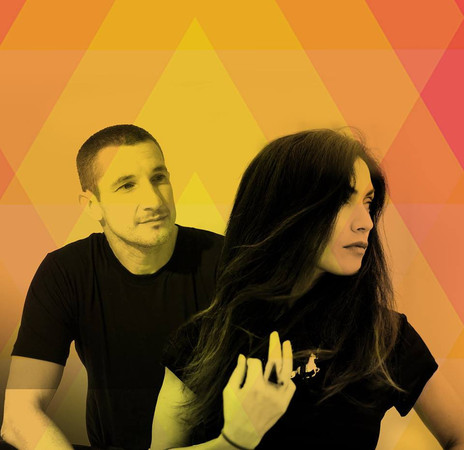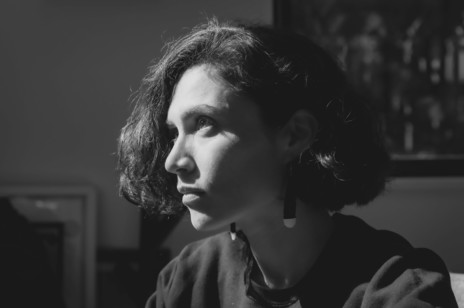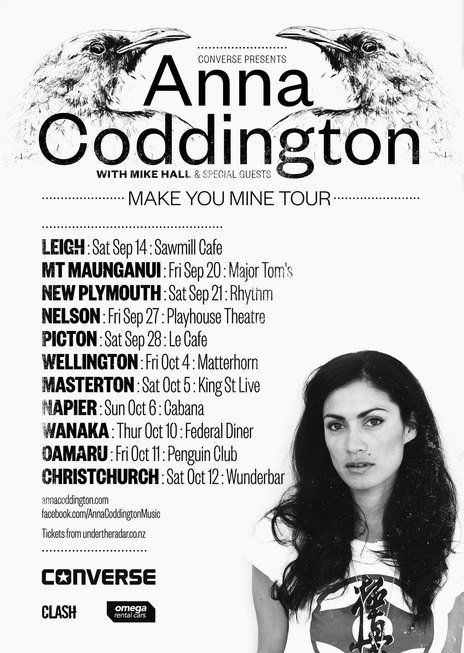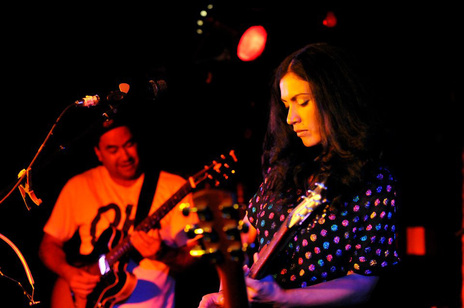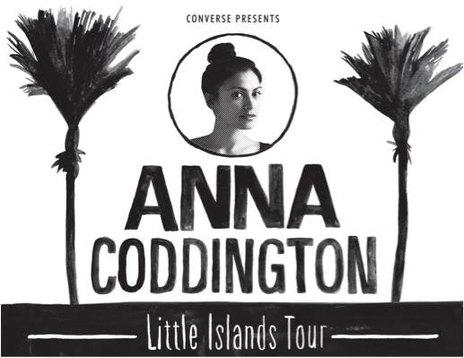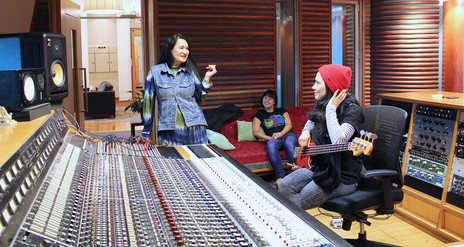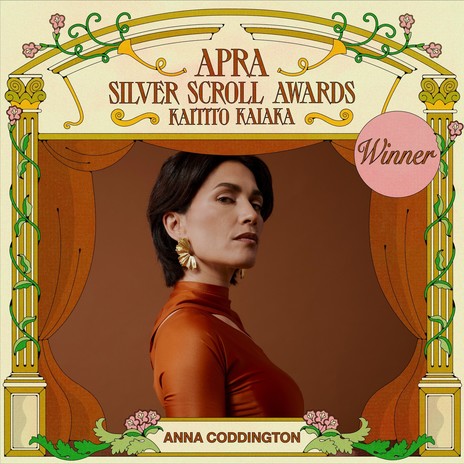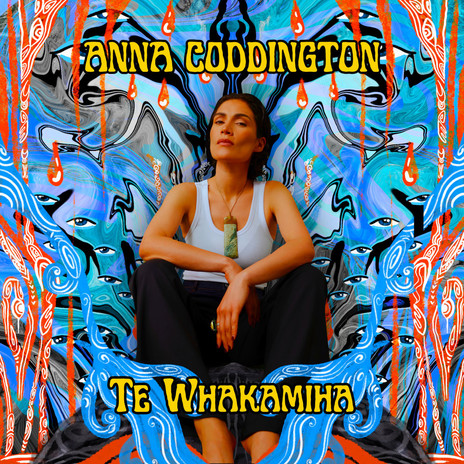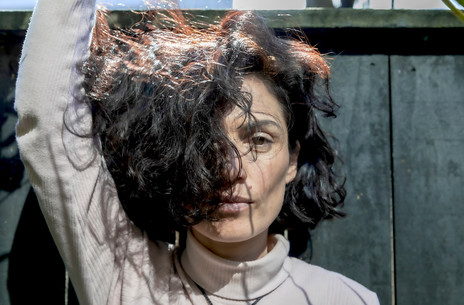Following a trail well-worn by other Waikato bands (including Cambridge garage rockers The Datsuns, formerly known as Trinket), Handsome Geoffrey began to perform more in Auckland. Playing as often as they could, the band became a fixture on live stages in the following years.
With the addition of Jonny Corker (ex-Rubicon) on drums, the band was renamed Duchess. Late in 2005 they released a self-titled five-song EP, recorded by Ed Cake at Platform Studios in Auckland, before Coddington’s talent was recognised and called on by a steady stream of established musicians.
Coddington went on a songwriting road trip with Bic Runga, Shayne Carter and Anika Moa.
Earlier that year Coddington went on a songwriting road trip with Bic Runga, Shayne Carter and Anika Moa. This led to the four, in various formations, sharing backing vocals on albums by Bic Runga (Birds, 2005), Anika Moa (Stolen Hill, 2005) and Shayne Carter’s Dimmer (There My Dear, 2006).
In person, she’s both staunch and charming, scholarly and earthy. A keen runner with a black belt in karate has strong connections to Tūwharetoa (central North Island), and Te Arawa (Rotorua) – and the landscapes there, as well as Auckland’s Western Springs Park. “I like to run around there and just be down there next to the lakes … I find the presence of water very calming, maybe because I grew up by the sea. I find being by a body of water very relaxing.”
Anna Coddington is not a name people expect for a Māori singer-songwriter. “People have been telling me that when I was first starting out, trying to talk me into changing my name. But what do you change your name to? You’ve got to live with it the rest of your career. Occasionally I kinda wish I had if only to save space on my posters. But I’m very indecisive, I hate naming my songs or my albums, picking a name for myself would be quite an ask.”
Spending time with Coddington – middle name Pinenga – her sense of humour shines. She cites it as one of the bonuses the audience get from experiencing her music live. “I think with any artist you get more of a sense of them as a person, physically and also personally. And there’s no trickery with live performance. Anyone can make something sound good in a studio these days. I think a good live performance is what will really separate the wheat from the chaff.”
Coddington also toured with Riki Gooch’s project Eru Dangerspiel and with Barnaby Weir’s Fly My Pretties.
Duchess called it a day in 2007 and Coddington became a solo artist, releasing her acclaimed debut album The Lake in 2008. Recorded at Roundhead studios and Radio New Zealand, players include guitarist Ned Ngatae and drummer Riki Gooch (TrinityRoots), with Steph Brown on keyboards and Chip Matthews on bass.
Then in 2011 came Cat & Bird, recorded at Roundhead, and co-produced with Ned Ngatae. Riki Gooch was a key collaborator and other musicians on the album include bassist Mike Hall (Pluto, Dimmer, The Bads) and keyboard player LA Mitchell. Coddington also toured with Gooch’s project Eru Dangerspiel and with Barnaby Weir’s live musical collaboration Fly My Pretties.
Cat & Bird’s ‘Little Islands’ is about feeling like there’s a glass ceiling in New Zealand. “You can see the rest of the world, you’re really aware of what’s going on in the music industry, or whatever industry, but it’s very hard to get out there and be a part of it from here because we’re so far away. It’s also about what’s awesome about living here.”
E rere wairua, e rere / Fly O free spirit, fly
Ki ngā ao o te rangi / to the clouds in the heavens
So begins Anna Coddington's version of 'Purea Nei' (a waiata by Henare Mahanga, modified and popularised by Hirini Melbourne). Coddington appreciates the song’s spiritual dimension. She has beautiful pronunciation, I say. “Kia Ora!” she smiles radiantly, before making a passionate case for all children to learn te reo Māori. “I studied at the AUT night classes, which was really cool. As a linguist, I think language is really precious and it’s a bee in my bonnet that Māori is such an effort to learn in the one country in the world where it’s spoken.”
Coddington and Mina Ripia walked away joint winners for the Best Māori Female Solo Artist award at the 2011 National Waiata Māori Music Awards. “This is the most laughs I’ve ever had at an awards ceremony," said Anna, collecting her prize, "and it is the first award I have received since I have been releasing my own albums.”
2013’s ‘Bird In Hand’, produced by SJD, is about letting go. “It sums up that feeling of watching someone fly away from you, and not really wanting that to happen. The lyrics say: ‘To watch you fly it hurts me, why can’t I be the one with my face to the sun?’ It’s partly about letting someone go without really wanting to but knowing it’s the best thing, and it’s partly about watching somebody else succeed and being happy for them but also feeling a bit left behind.”
Electric Wire Hustle’s Mara TK has dubbed her “Pania of the Streets”. She is into rap, and Home Brew’s Haz produced a hip-hop version of ‘Bird In Hand’.
There’s a spacious, unfastened feel to Coddington’s music. “I like that spacious vibe because it’s a good head space to be in, cluttered anything is not my buzz. I live by the mantra ‘tidy house, tidy mind’. The first thing I do every morning is tidy up and I can’t start working until everything is tidy.”
She is now focusing on singles, such as ‘Make You Mine’ and ‘The Runner’. In June 2014 she told me she was on the verge of having something musically new and exciting. “I’m finding a way to fit making music in around the schedule of an infant.”
For a while, Coddington was the most-played artist on Australian TV soap ‘Home and Away’
One achievement that might surprise people about Coddington is that for a time, she was the most-played artist on Australian TV soap Home and Away. The music industry’s not easy to live off, but it’s still good. “Totally. And I think if you’re willing to work hard you can make it work. There are lots of ways to make little bits of money. You’ve just got to try and enjoy it, otherwise, go and not enjoy something else and get paid. That’s what it comes down to.”
An enjoyable diversion came early in 2016 when Coddington - while pregnant with her second child – performed at the Auckland Arts Festival in Dust to Dusky, a tribute to Dusty Springfield which also featured Bella Kalolo, Tami Neilson and Colleen Davis. In September 2016, she gave one of the standout performances at the APRA Silver Scroll, interpreting Rob Ruha’s Maioha award-winning waiata, ‘Kariri’.
Shortly afterwards, Coddington released Luck/Time, through Loop: an album of 12 original songs. Graham Reid wrote, “When she couches these songs in all that post-R&B electro-pop can offer, [they] are given grooves that grip, the melodic hooks come to the fore with ear-catching backing vocals and the strings add emotional weight and breadth.”
In 2017 Coddington formed the duo Clicks with her partner, Dick Johnson.
--
Since Anna Coddington’s last album as a solo artist in 2016, her work has been characterised by avid collaboration. Alongside her electronica project Clicks with partner Dick Johnson, Coddington has performed with the Blackbird Ensemble, Fly My Pretties, the Auckland Philharmonia Orchestra and Eru Dangerspiel – to name a few.
"[Collaboration] is something I've been building into confidence-wise,” she told RNZ’s Sunday Morning in 2018. “When I started out, especially because I was self-taught… [I] felt like I was always muddling my way through, I didn't have a lot of confidence to collaborate… Now I feel it’s the thing I want to do most.”
2020 was another significant year for Coddington’s co-creation, with her composing for local TV show Head High and being a driving force behind ‘Tūtahi – Stay’, a lockdown charity single featuring a who’s who of New Zealand recording artists.
And of course Coddington’s moving performance with the Wha Cups at the 2020 APRA Silver Scroll must be mentioned. Alongside Anika Moa, Julia Deans, Tali, Hollie Smith and Lauren Barus (aka L A Mitchell), the group performed an a capella version of Weta’s ‘Calling On’, to honour the life of Aaron Tokona, who died in 2020. Coddington posted the performance video onto social media, on October 29, with a special note: “It was Aaron’s birthday yesterday! So extra special to watch this back and be able to cry the tears I had to hold back while we performed it.”
Much as she loves working with her friends and peers, it was actually the last four years of collaboration that inspired Coddington to write a new solo album. Beams was released November 2020, and she describes it as an exercise in “ruthless self-expression”.
Coddington’s 2020 album ‘Beams’ was produced by Steph Brown and Fen Ikner, aka LIPS
Ahead of the album release she told Newstalk ZB that traditional pop songwriting was at times disregarded so that she could “say what I wanted to say”. Coddington says the key themes to inspire Beams were parenthood, whakapapa and identity – all present on the first single ‘The Saint (with stains)’. “We all wear many hats and for me, the album has been a process of … exploring how I wear those different hats, manage those different identities.”
Beams is Coddington’s first album not to be self-produced, with the Silver Scroll winning duo behind LIPS – Steph Brown and Fen Ikner – taking on the role. The pair undoubtedly bring their pop-electronica influence to the work, but Beams is inherently an indie album. “I really wanted the songs to stand up in their original form, which was guitar and vocals,” she told Newstalk ZB. “That was one important thing, that the songwriting was strong enough that they could exist only with that.”
The album brings another first for Coddington: a duet. The title track features soul singer Louis Baker in what Under The Radar calls “a power ballad”. The new material is showcased as part of her Test the Waters tour, on the national circuit in November 2020.
- Update by Rosie Howells, November 2020
--
The song ‘Beams’ became a million streamer, with its evocative keyboard melody, vamped guitar, and insistent drums providing the perfect backdrop for the sweetly harmonising voices of Coddington and Baker. The Covid years disrupted some of her live shows, but she already had a new project underway.
The Mana-Wa-Hine EP was Coddington’s first attempt at creating her own music in te reo Māori (rather than doing covers, such as with ‘Purea Nei’). She hadn’t grown up speaking the language, but when her sons began attending Kōhanga Reo this inspired her to prioritise her own te reo studies. She needed help with introducing te reo into her songwriting and worked with Ria Hall on title track ‘Mana-Wa-Hine,’ the name being a reo play on words, since it could either be read as “Manawa Hine” which means the heart of a girl or as “Mana Wāhine” which is the mana of a woman. The EP’s other four songs were translations of previous works carried out for her by Scotty and Stacey Morrison, with one of them being ‘Aho / Beams’.
Coddington found the process of reclaiming te reo was enriching and exhilarating, but also at times arduous and painful.
“If a continuum of Māoriness could be analogised by putting ‘growing up near your marae, doing kapa haka and speaking te reo’ at one end and ‘listening to Nirvana, starting an alt-pop band and spending six years of your life learning Japanese’ at the other, I was the embodiment of the latter. I didn’t grow up with te reo. It was my Koro/Grandfather’s first language but like many of his generation, after being physically punished for speaking Māori as a child, he understandably didn’t want his children to experience the same. The song ‘Night Class / Akoranga Pō’ is about this.
“Of course the tide is slowly turning on those attitudes, and many in my generation are putting their kids into Māori language education so they don’t have to spend their twenties, thirties and forties in night classes trying to bend their minds around i/ki, a/o, whakataukī and other concepts of te reo Māori that tell us so much about how our ancestors perceived the world.”
Mana-Wa-Hine was awarded Best Te Reo Māori Album at the Māori Music Awards and Coddington showed another string to her bow when she became musical director and music composer for TV show Kid Sister, directed by her old Duchess/Handsome Geoffrey bandmate Aidee Walker. Coddington also made her debut producing other people’s work when she helped young act Davidda on her song ‘Slow Turn’.
In the Auckland floods of 2023, Coddington experienced a terrible upheaval
Coddington was already underway with recording her next album when her homelife went through a terrible upheaval. On Auckland’s Anniversary weekend in January 2023, the city was ravaged by torrential rain, and her house was hit by flash flooding. She and her partner, DJ Dick Johnson, retreated to the second floor with their children, while the waters rose up the stairs behind them at an astonishing speed. They were forced to climb out an upper window to be rescued by a neighbour in a kayak. They lost most of their belongings, including both of their cars. A more heart-wrenching loss was Coddington’s guitars and a box filled with handwritten lyrics from every song she’d ever written.
Two weeks later, Cyclone Gabrielle caused extensive damage on the east coast of the North Island and despite Coddington’s own troubles, she took part in a relief concert held in West Auckland, which raised $700,000 for victims of the flooding. Coddington rounded out 2023 by releasing a picture book she’d written, Blue, Blue Christmas. Inside was a QR code that connected to a song she had written based on the book, which allowed readers to sing along.
Her April 2024 single ‘Kātuarehe’ showed a hint of the “Māori funk” she had brewed up for her new album. The tracks were primarily written in te reo Māori, but cleverly featured occasional lines/sections in English as access points for listeners who didn’t understand the language. She worked on the album with her regular backing group The Appreciations (Jol Mulholland, Fen Ikner, and Mike Hall), so using a rough translation of the band name, called the album Te Whakamiha (2024).
Troy Kingi featured on ‘Honeyback’, which started on a smoky slow groove with lyrics in English, encouraging a friend to drop their useless partner. After the first chorus, the song’s words repeated in te reo Māori, providing a way for non-speakers to understand what was being said while appreciating the sound of the language. The album showed more sides to Coddington’s talents, ranging from the almost-rapped 80s style of ‘GAINZ’ through to the spirited indie rock of ‘Mōhou Rā’.
It was clear that Coddington had brought all her experience from two decades of making music to the new album. Rather than revisiting where she had been as an artist, the work sounded incredibly fresh and provided the best example to date of Coddington’s undimmed skills as a songwriter and musician.
On 8 October 2024 the song ‘Kātuarehe’ from Te Whakamiha won the APRA Silver Scroll Award; it was written by Coddington with Noema Te Hau III, Ruth Smith, and Kawiti Waetford.
- Update by Gareth Shute, October 2024
